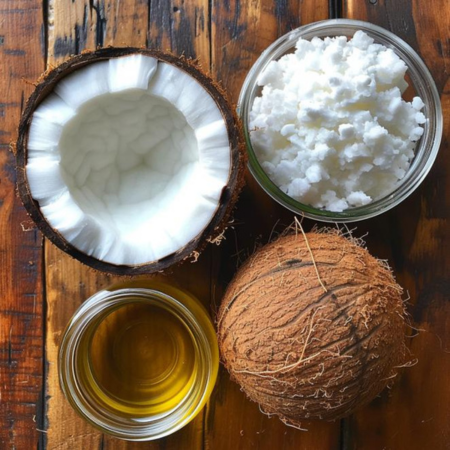Can You Microwave Coconut Oil? The answer is not always straightforward as safety is concerned when handling any heated oil.
Coconut oil, the much-lauded health food, can be quite the enigma in the kitchen. You reach for the jar only to find a solid mass one day and a clear liquid the next.
When melting this versatile oil, the microwave might be your quickest option. But before you toss that jar in and hit ‘start’, let’s unravel the mystery of microwaving coconut oil.
Join us as we delve into the world of microwaves and this tropical treasure, exploring how to do it correctly, its benefits to your recipes, and the precautions to take. Welcome to the ultimate guide to microwaving coconut oil!
Key Points
- Microwaving coconut oil is quick, convenient, and entirely safe.
- Consistency varies due to coconut oil’s unique melting point.
- Melting enhances infusion of coconut flavor in your dishes.
- Overheating in a microwave may lead to uneven melting.
- Always use microwave-safe containers to prevent unwanted accidents.
Can You Microwave Coconut Oil?
You can microwave coconut oil. This is a safe and efficient way to melt it. But how does it work exactly?
Microwaves heat through a process called “dielectric heating”. In simpler terms, they cause water and fat molecules to vibrate, creating heat. So, when you microwave coconut oil, you’re forcing its molecules to move and generate heat.
Coconut oil has a low melting point, about 78°F. Hence, a few seconds in the microwave is usually enough to turn it from solid to liquid. If you’re unsure how long to microwave, start with 15-second intervals. This prevents overheating and maintains the oil’s nutritional properties.
How do you do it? Easy. Scoop the needed coconut oil quantity into a microwave-safe container. Cover it with a microwave-safe lid or microwave-safe wrap to avoid splatters. Then, melt away!
Why should you microwave coconut oil? Melting the oil enhances its versatility in cooking. It helps blend ingredients smoothly, especially in baking. It also allows for even distribution of flavors in dishes like stir-fries or curries.
Finally, let’s talk about precautions. Never microwave coconut oil in its original jar, especially if it’s glass or metal. Also, remember that it heats quickly. So, always start with short microwave intervals and stir between each one.
In conclusion, microwaving coconut oil is doable, efficient, and beneficial. However, it’s crucial to do it right to preserve its nutrition and ensure safety.
The Science of Microwaving: What Happens To Coconut Oil?
When microwaved, coconut oil experiences a fascinating transformation. The underlying scientific principles are captivating. Let’s delve into this process.
Microwaving creates electromagnetic waves. These waves penetrate the oil, setting its molecules in motion. This vigorous movement generates heat, which leads to melting.
A key factor here is the oil’s dielectric constant. This measures its ability to store and conduct electric energy. Coconut oil has a high dielectric constant, meaning it heats faster.
Remember, though, the microwave’s power level matters too. Higher power means more intense waves. However, balance is key. Too much power can risk overheating.
Does microwaving alter the oil’s composition? Not significantly. The process is gentle, preserving the oil’s nutrients, like lauric acid, a potent antimicrobial compound.
Now, what about taste? Good news! Microwaving doesn’t change the oil’s flavor profile. It retains its unique, subtly sweet, and nutty taste, perfect for both savory and sweet dishes.
Overall, microwaving coconut oil is a science-backed method that’s safe, efficient, and easy. It maintains the oil’s nutritional value and flavor, making it an excellent choice for various culinary applications.

How To Microwave Coconut Oil: A Step-by-Step Guide
Step 1: Choose the Right Container
Select a microwave-safe container. It should be large enough to prevent the oil from overflowing.
Step 2: Measure the Oil
Pour the needed amount of coconut oil into the container. Don’t fill to the top.
Step 3: Set the Microwave
Place the container in the center of the microwave. This ensures even heating.
Step 4: Choose Power and Time
Set your microwave to a medium power setting. Start with a short time – one minute usually suffices.
Step 5: Monitor the Process
Keep an eye on the oil while it’s heating. This helps prevent overheating.
Step 6: Stir and Check
When the time is up, carefully remove the container. Stir the oil gently. Check its consistency.
Step 7: Repeat if Necessary
If the oil isn’t fully melted, return it to the microwave. Heat in 15-30 second increments till it’s completely liquid.
Remember, every microwave is different. You may need to adjust your specific model’s time and power settings. Also, handle the melted oil with care. It will be hot.
By following these steps, you can safely and effectively microwave coconut oil. The key is to heat slowly and monitor the process. This method preserves the oil’s nutrients and flavor, making it an excellent choice for cooking.
10 Benefits Of Microwaved Coconut Oil In Your Recipes
Incorporating microwaved coconut oil into your recipes has multiple benefits. Here’s a list of ten:
- Boosts Metabolism: Coconut oil contains Medium-Chain Triglycerides (MCTs), increasing energy expenditure and accelerating metabolism.
- Aids Weight Loss: MCTs in coconut oil help in controlling appetite, facilitating weight loss.
- Enhances Heart Health: The healthy fats in coconut oil may increase “good” HDL cholesterol, promoting heart health.
- Improves Digestion: Coconut oil aids in absorbing fat-soluble vitamins, calcium, and magnesium.
- Strengthens Immunity: It contains lauric acid which has antimicrobial properties boosting immunity.
- Promotes Skin Health: Coconut oil moisturizes skin and reduces symptoms of eczema.
- Improves Hair Health: It nourishes hair, reducing protein loss and damage.
- Boosts Brain Function: The MCTs in coconut oil provide an alternative energy source for the brain, enhancing cognitive function.
- Regulates Blood Sugar: It helps regulate blood sugar levels, benefiting individuals with diabetes.
- Enhances Flavor: Coconut oil adds a unique, rich flavor to dishes.
Add microwaved coconut oil to your meals and reap these benefits. It’s a simple way to enhance your health while elevating the taste of your food.
The Do’s And Don’ts of Microwaving Coconut Oil
Do’s:
- Do measure the quantity before microwaving. A small amount of coconut oil goes a long way.
- Do use a microwave-safe container. This ensures that the container doesn’t melt or warp.
- Do cover the container lightly. This prevents oil from splattering inside the microwave.
- Do microwave in short bursts. It will prevent the oil from getting overheated.
- Do let the oil cool before using. It allows the temperature to normalize.
Don’ts:
- Don’t microwave the oil for too long. It can lose its beneficial properties.
- Don’t leave the microwave unattended while heating. Overheated oil can cause a fire.
- Don’t use plastic containers. They can release harmful substances when heated.
- Don’t ignore smoke or a burnt smell. Stop the microwave immediately.
- Don’t pour hot oil directly into your dishes. It can cause the food to cook unevenly.
Following these do’s and don’ts will ensure you get the most out of your microwaved coconut oil. It’s all about being safe, maintaining the oil’s nutritional profile, and enhancing your recipes’ taste and texture.
Safety Measures To Consider When Microwaving Coconut Oil
Even though microwaving coconut oil is relatively safe, certain precautions are necessary.
Here are the key measures to keep in mind:
- Awareness: Understand your microwave settings. Not all microwaves heat at the same pace. Being aware of your appliance’s specific features is crucial.
- Careful Handling: Hot oil can cause burns. Always use oven mitts or a thick cloth when handling a container with heated coconut oil.
- Prevent Overheating: Keep an eye on the oil while it’s in the microwave. Stop the heating process if you notice smoke or an unusual smell.
- Proper Ventilation: Ensure good ventilation in the microwave. Partially cover your container to prevent oil splatter, but allow some space for steam to escape.
- Avoid Water: Never add water to heated oil. It can cause the oil to splatter dangerously, leading to burns.
- Emergency Preparedness: Have the right tools nearby to manage any unexpected situation. This includes a fire extinguisher, oven mitts, and a first aid kit.

Remember, safety first. Applying these measures will enable you to use coconut oil’s benefits optimally while ensuring a safe cooking environment.
Coconut oil is extremely versatile and can be a great addition to your diet. However, as with anything, using it responsibly and safely is essential.
Heed these precautions, and you’re all set to enjoy the many perks of this amazing oil!
Frequently Asked Questions
Q1: Can I microwave coconut oil in its original jar?
A: It’s generally not recommended to microwave coconut oil in its original jar, especially if it’s made of glass or plastic. Use a microwave-safe bowl instead to ensure safety.
Q2: How long should I microwave coconut oil?
A: The exact time can vary depending upon the quantity of oil and the power of your microwave. Start with a low setting and short intervals of time, like 20-30 seconds. You can continue heating in these short bursts until the oil is melted.
Q3: Can overheating damage the health benefits of coconut oil?
A: Overheating can degrade some of coconut oil’s beneficial properties. It’s always recommended to heat it gently and avoid reaching its smoke point.
Conclusion
Coconut oil, with its myriad health benefits and culinary uses, has rightly earned its place in the kitchens of health-conscious individuals.
However, safety is paramount when handling any form of heated oil. Always use microwave-safe containers for heating, avoid splatters by not adding water, and be prepared to handle any emergencies.
Following these safety measures ensures a pleasant cooking experience, allowing you to enjoy the benefits of coconut oil without any risks.
- Can You Put A Crock Pot In The Microwave: 4 Safety Tips - April 27, 2024
- Can You Microwave Wax Beads: 8 Easy Steps - April 26, 2024
- Can You Microwave Vaseline: A Comprehensive Guide - April 25, 2024

